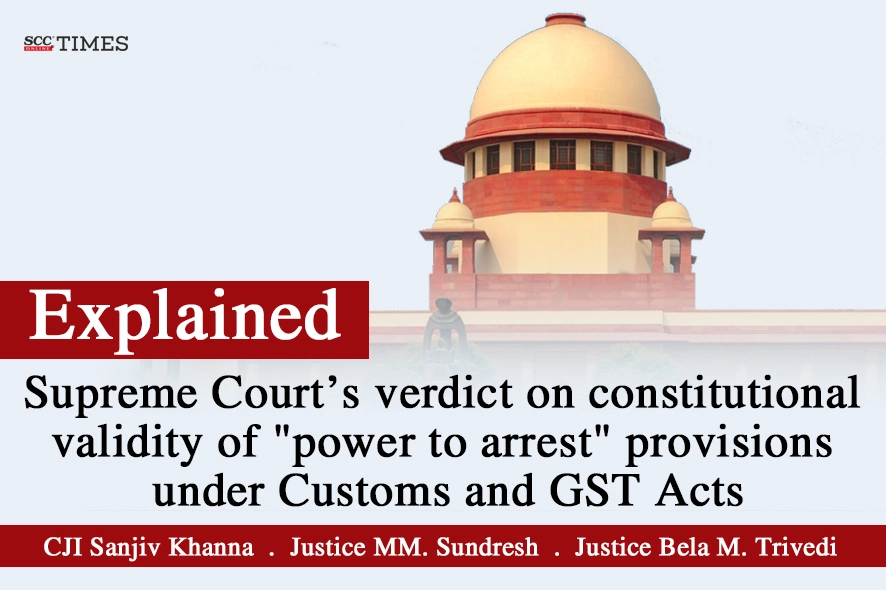Supreme Court: In a matter concerning the power to arrest under the Customs Act, 1962 and the Central Goods and Services Tax Act, 2017 (‘CGST Act’), the three Judge Bench of Sanjiv Khanna*, CJI, MM. Sundresh and Bela M. Trivedi**, JJ. rejected the challenge to the constitutional validity as also the right of the authorised officers under the Customs Act and the GST Acts to arrest with elucidation and clarification on the pre-conditions and when and how the power of arrest is to be exercised.
Analysis and Decision
The Court noted that the power to arrest under the Customs Act, 1962 and the CGST Act stems from the decision of a three Judge Bench in Om Prakash v. Union of India (2011) 14 SCC 1. Before this decision, offences under the Customs Act were treated as non-bailable and once arrested, the accused would be detained for a few months before being released on bail. In Om Prakash (supra), it was held that the offences under the Customs Act and the Central Excise Act, 1944 were non-cognizable and, therefore, even if the officers had the power to arrest, they could do so only after obtaining a warrant from the Magistrate in terms of Section 41 of the Code of Criminal Procedure, 1973. It was also held that offences under the Customs Act and the Excise Act were both bailable, bearing a punishment of less than 3 years.
The principle being that the customs officers and excise officers, though conferred the power of arrest under the respective enactments, the offences being non-cognizable, were not vested with powers beyond that of a police officer in charge of the police station.
After taking note of the definitions of Cognizable offence, non-cognizable offence and Section 155 of CrPC, the Court highlighted that without an order from the Magistrate and a warrant, a police officer cannot arrest an accused for a non-cognizable offence.
The Court took note of Section 104 of the Customs Act and observed that given the amendments enacted after Om Prakash (supra) — the 2012 Amendment, the 2013 Amendment, and the 2019 Amendment — certain categories of offences have been carved out and explicitly made cognizable in terms of Section 104(4). Some of the cognizable offences have been made non-bailable in terms of Section 104(6). All other offences under the Customs Act are non-cognizable, unless carved out in Section 104(4), and bailable, as they are excluded in Section 104(6).
Referring to Sections 4 and 5 of CrPC, the Court noted that the provisions of CrPC would be applicable to the extent that there is no contrary provision in the special act or any special provision excluding the jurisdiction and applicability of the Code.
The Court remarked that the submission that customs officers are police officers is both unfounded and flawed.
The Court has observed that the amendments introduced to the Customs Act in 2012, 2013, and 2019 are substantive in nature and were specifically aimed at effectively altering the application of the judgment in Om Prakash (supra). The earlier ruling required customs officers to seek prior approval from a Magistrate before making an arrest. However, these amendments have now redefined the framework by designating certain offences as cognizable and non-bailable. Furthermore, the amendments outline specific preconditions and stipulations for making an arrest. Considering these changes, the petitioners’ reliance on Om Prakash (supra) is no longer valid. The amendments have effectively superseded the earlier decision, and therefore, their argument based on that case must be rejected.
The Court highlighted that while customs officers do not undertake an investigation akin to Chapter XII of CrPC, they enjoy analogous powers such as the power to investigate, arrest, seize, interrogate, etc. under the Customs Act. Thus, the obligation to provide grounds of arrest is incumbent upon them. Customs officers must also maintain records of their statutory functions including details like the name of the informant, name of the person who has violated the law, nature of information received by the officers, time of arrest, seizure details, and statements recorded during the course of detection of the offence(s).
The Court held that Section 41-B which outlines the procedures of arrest and the duties of the officer making the arrest, although refers to the police officer, it equally imposes a duty on the customs officers. Further, it held that Sections 41-D, 50 A (2) and (3) and 55 A of CrPC and of CrPC are applicable for offences under the Customs Act.
The Court remarked that “the above findings do not in any way fall foul of or repudiate the provisions of the Customs Act. They complement the provisions of the Customs Act and in a way ensure better regulation, ensuring due compliance with the statutory conditions of making an arrest”.
The Court compared Section 19(1) of the Prevention of Money Laundering Act (‘PMLA’), envisaging the Directorate of Enforcement power of arrest, and Section 104(1) of the Customs Act, envisaging the customs officer’s power of arrest.
The Court observed that Section 104(1) of the Customs Act specifies that arrests may be made if a customs officer, empowered by a general or special order from the Principal Commissioner of Customs or Commissioner of Customs, has “reasons to believe” that an offence has been “committed” under Sections 132, 133, 135, 135-A, or 136 of the Customs Act. In this regard, Section 104(1) effectively incorporates safeguards akin to those found in Section 19(1) PMLA.
However, the Court highlighted a semantical distinction between Section 19(1) PMLA and Section 104(1) of the Customs Act, which is twofold. Firstly, Section 104(1) does not explicitly require a customs officer to have “material in their possession.” Secondly, Section 104(1) does not state that the customs officer must reasonably believe the arrestee to be “guilty of an offence.” Instead, it simply requires that the officer have “reasons to believe” that the arrestee has “committed an offence.”
In light of these differences, the Court opined that there is, substantively, no difference between a person being “guilty” of an offence and a person “committing” an offence. Thus, as far as the application of Section 19(1) of the PML Act and Section 104(1) of the Customs Act is concerned, a person being “guilty” of an offence and a person “committing” an offence are identical and self-same.
The Court clarified that Section 104(1) does not explicitly require a customs officer to have “material in their possession” does not imply that a customs officer can conclude that an offence has been committed out of thin air or mere suspicion. The threshold for arrest under Section 104(1) is higher than that under Section 41 CrPC. Section 41 allows the police to arrest a person without a warrant, if a “reasonable complaint has been made”, or “credible information has been received”, or “a reasonable suspicion exists” that the person has committed a cognizable offence. In contrast, Section 104(1) sets a higher threshold, stipulating that a customs officer may only arrest a person if they have “reasons to believe” that a person has committed an offence.
The Court underscored that given the framework of the Customs Act, which explicitly classifies offences into bailable and non-bailable, as well as cognizable and non-cognizable, the “reasons to believe” must reflect these classifications when justifying an arrest. The reasoning must weigh in why an arrest is being made in a specific case, particularly given the specific severity assigned to the offence by the legislature. The reasoning must also state how the monetary thresholds outlined in the Act are met.
The Court said that the framework of the Customs Act clearly reflects the legislative intent to establish a distinct and unique procedure for the exercise of arrest powers by a customs officer, as Section 104(4), specifies only 4 categories of offences as cognizable, outlined under sub-sections (a) to (d). Section 104(5) clarifies that all other offences under the Customs Act are non-cognizable in nature, meaning that arrests for these offences cannot be made without a warrant. An unbridled exercise of the power to arrest without a warrant can result in arbitrariness and errors in decision making process. A similar error made by a customs officer can lead to a frustration of the constitutional and statutory rights of the arrestee.
Thus, the Court denied any inconsistency between Section 19(1) PMLA and Section 104(1) of the Customs Act, and opined those principles and ratio developed in the case of Arvind Kejriwal v. Directorate of Enforcement (2025) 2 SCC 248 and the principles specifically discussed and delineated in this judgment, are equally applicable to the power of arrest under Section 104 of the Customs Act. Therefore, the Court directed the Union of India to comply with the mandate of this judgment and that of Arvind Kejriwal (supra).
The Court also emphasised that failing to provide the grounds for arrest in writing would effectively deprive the accused of their rights under Section 104(1) of the Customs Act, as well as their right to seek bail under the provisions of the Code of Criminal Procedure. Such an interpretation aligns with the constitutional guarantees enshrined in Article 22(1) of the Constitution. Moreover, it ensures that the arrested individual is not denied the right to consult and be defended by a legal practitioner of their choice.
Therefore, the Court rejected the challenge to the amendments as well as provisions of the Customs Act.
Concerning the provisions of the GST Acts, the Court said that the reasoning and the ratio on the applicability of CrPC to the Customs Act would equally apply to the GST Acts in view of Sections 4 and 5 of CrPC. The Court agreed with the contention that the GST Acts are not a complete code when it comes to the provisions of search and seizure, and arrest, for the provisions of CrPC would equally apply when they are not expressly or impliedly excluded by provisions of the GST Acts.
The Court noted that there was no specific stipulation or provision in the GST Acts in respect of facets of investigation, inquiry or trial.
The Court took note of Sections 69, 132 of the GST Act, and highlighted that to pass an order of arrest in case of cognizable and non-cognizable offences, the Commissioner must satisfactorily show, vide the reasons to believe recorded by him, that the person to be arrested has committed a non-bailable offence and that the pre-conditions of Section 132 (5) of the Act are satisfied. Failure to do so would result in an illegal arrest.
With regard to the submission made on behalf of the Revenue that arrests are not made in case of bailable offences, the Court viewed that, the Commissioner, while recording the reasons to believe should state his satisfaction and refer to the ‘material’ forming the basis of his finding regarding the commission of a non-bailable offence specified in clauses (a) to (d) of sub-section (1) to Section 132. The computation of the tax involved in terms of the monetary limits under clause (i) of sub-section (1), which makes the offence cognizable and non-bailable, should be supported by referring to relevant and sufficient material.
Concerning the allegation made by the petitioners, that the parties are compelled and coerced to admit and make payment of tax in view of the threat of arrest, the Court observed that in case there is a breach of law, and the assessees are put under threat, force or coercion, the assessees would be entitled to move the courts and seek a refund of tax deposited by them. The department would also take appropriate action against the officers in such cases. However, the Court clarified that a person summoned under Section 70 of the GST Acts is not per se an accused protected under Article 20(3) of the Constitution, as has been held in the case of Directorate of Enforcement v. Deepak Mahajan, (1994) 3 SCC 440. This is because the prohibitive sweep of Article 20(3) of the Constitution does not go back to the stage of interrogation.
The Court further clarified that the power to grant anticipatory bail arises when there is apprehension of arrest. This power, vested in the courts under the CrPC, affirms the right to life and liberty under Article 21 of the Constitution to protect persons from being arrested.
Concerning the constitutional validity of Sections 69 and 70 of the GST Acts which provide for the power to arrest and the power to summon, the Court held that a penalty or prosecution mechanism for the levy and collection of GST, and for checking its evasion, is a permissible exercise of legislative power. The GST Acts, in pith and substance, pertain to Article 246-A of the Constitution and the powers to summon, arrest and prosecute are ancillary and incidental to the power to levy and collect goods and services tax.
Thus, the Court rejected the challenge to the constitutional validity as also the right of the authorised officers under the Customs Act and the GST Acts to arrest with elucidation and clarification on the pre-conditions and when and how the power of arrest is to be exercised.
CASE DETAILS
|
Citation: Appellants : Respondents : |
Advocates who appeared in this case For Petitioner(s): For Respondent(s): |
CORAM :











